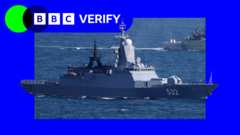German authorities have confirmed that the oil tanker Eventin, which ran aground in the Baltic Sea, is linked to Russia's shadow fleet, raising alarms regarding sanctioned oil transport methods and regional security threats.
Germany Identifies Russian 'Shadow Fleet' Vessel Stuck in Baltic Sea

Germany Identifies Russian 'Shadow Fleet' Vessel Stuck in Baltic Sea
Concern Mounts Over Security and Environmental Risks Posed by Shadow Fleet Operations
German maritime authorities have reported that an oil tanker named Eventin, currently stranded in German waters, is associated with Russia's so-called "shadow fleet." This fleet is believed to operate as a means for Russia to bypass sanctions that emerged in the wake of its aggressive military actions in Ukraine. The Eventin, flagged under Panama, lost both power and steering capabilities while drifting in the Baltic Sea, prompting the deployment of several tugboats for a rescue operation.
Annalena Baerbock, Germany's Foreign Minister, directly accused President Vladimir Putin of attempting to subvert European security through the usage of outdated tankers. The shadow fleet is a term used for aging vessels that often evade maritime regulations, frequently changing names and flags, thus obscuring their true ownership. The United States, United Kingdom, and the EU have implemented strict sanctions on the Russian oil sector since Russia’s invasion of Ukraine, making these developments noteworthy.
The Eventin measures 274 meters long and 48 meters wide, with an estimated capacity of 99,000 tonnes of oil. No oil leaks have been reported following the incident, a relief for local environmental concerns. A specialized team was airlifted onto the tanker on Friday night to establish tow lines, enabling three tugboats to take control of the situation. By Saturday evening, progress was recorded, with the convoy making its way to Sassnitz, a town located on Rügen Island.
As authorities work to ensure the safety of the operation amidst rough seas, Baerbock highlighted the broader repercussions of Russian operations, denouncing not only illegal military actions but also sabotage efforts such as severed undersea cables and disinformation campaigns. The situation surrounding the Eventin coincides with recent moves by Western powers to impose sanctions on Russian energy companies, aiming to diminish funding for Russian military efforts.
In the context of these ongoing tensions, recent reports suggest that the shadow fleet plays a crucial role in facilitating Russia's oil exports, often lacking the insurance and maritime compliance that standard operations require. The identification of the Eventin raises significant concerns about the security and environmental implications of Russia's maritime activities.






















